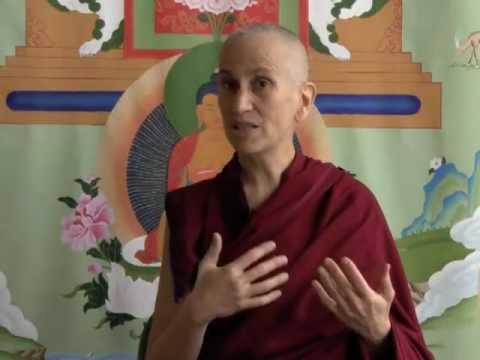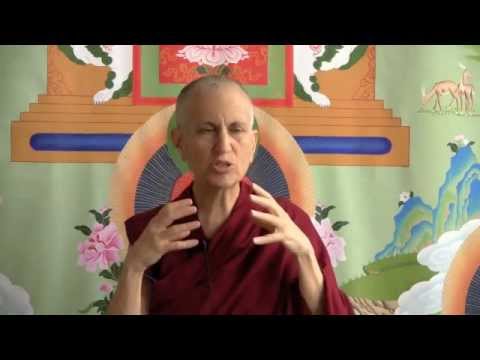Ill will
The second of five hindrances to concentration
This talk was given during the White Tara Winter Retreat at Sravasti Abbey.
- How anger distracts us from our object of concentration
- The importance of introspective awareness
- Suggestions from nonviolent communication
- Learning to deal with our needs ourselves
White Tara Retreat 25: Concentration hindrance of ill will (download)
Another thing that we have to deal with when we’re trying to concentrate in our meditation is ill will or malice coming up. It’s another one of the five hindrances.
Getting angry
Here, instead of getting distracted by all the things we like (and that we’re craving, and daydreaming, and planning how to get them), we start getting angry at people who aren’t even in the room with us usually! We’re trying to focus on White Tara and who comes to mind? Somebody who insulted us, somebody who beat us up, somebody who we’re jealous of, basically just somebody who we have some negative feelings towards; and we forget White Tara. You know, we get really revved up. You can feel your body getting tense because you’re getting angry at that person. Then you start worrying about what’s going to happen next time you see them. So you start making plans about how to defend yourself and how to maybe get back at them before they can do something harmful to you again. We get all tied up in this—which is the complete opposite of our motivation of love, compassion, and bodhicitta that we generated at the beginning of the meditation session.
A mind of introspective awareness
It’s very important that we have a mind of introspective awareness that notices that we’ve gone off track; and that labels it and says, “I’m angry, and this is a hindrance in my meditation, and this is a destructive mental state, and so I need to counteract it.” The way to counteract it is not by stuffing the anger down. If we stuff it down it’s just going to come out in all sorts of other ways. What we have to do is all these meditations on how to practice patience or fortitude in order to make our mind strong; so that it’s strong in the confront of harm, or strong in the confront of pain and suffering.
Recommended reading
That’s why the book, Working with Anger, is very good. I can’t do all of Working with Anger on the Bodhisattva’s Breakfast Corner. But I can recommend you read it, or His Holiness the Dalai Lama’s book, Healing Anger, which is also very good. We can really train ourselves in those different meditations and perspectives so that we can do something with our anger and diffuse it, so that there’s nothing to suppress or stuff down.
Nonviolent communication
The nonviolent communication can be very helpful in this respect because it asks us to be in touch with our own feelings and our needs. So when we’re angry, what is it that we need? We also might say, “I need you to shut up!” No. That’s not the correct way. That’s not the way to phrase the need, okay? It’s not, “I need you to do something or to be something.” You don’t phrase it in terms of the other person. You phrase it in terms of yourself, “I’m angry because I need to be more confident of how I can diffuse these situations in a nonviolent manner.” Or, “I’m angry because I don’t feel so confident about expressing myself in this situation.” Or, “I’m angry because I need to be more confident than I already am in how to express myself.” Or, “I’m angry because I expressed my view.”
You don’t even need to use the cause [of the feeling or anger]. Just say, “I need respect,” or, “When I say something I would like it to be honored.” Or, “I need some sleep. I’m angry because I need some sleep.” We don’t need to explain a lot of reasons, but if we’re in touch with what we need then that can be helpful. Also we have to be clear that we don’t expect other people to meet our needs. We can make a request that they do something but we (in nonviolent communication language), have to give ourselves some empathy when our needs cannot be met by outside circumstances—which is very often.
Dharma to fulfill our needs
To learn to deal with our needs ourselves is where Dharma comes in. Dharma can help us fulfill some of those needs and be more aware of them, so they don’t run our life and make all sorts of unhappy feelings and unhappy emotions come out. That’s the big thing to work on in our meditation. Otherwise it’s very difficult to focus on White Tara, isn’t it?
Venerable Thubten Chodron
Venerable Chodron emphasizes the practical application of Buddha’s teachings in our daily lives and is especially skilled at explaining them in ways easily understood and practiced by Westerners. She is well known for her warm, humorous, and lucid teachings. She was ordained as a Buddhist nun in 1977 by Kyabje Ling Rinpoche in Dharamsala, India, and in 1986 she received bhikshuni (full) ordination in Taiwan. Read her full bio.


